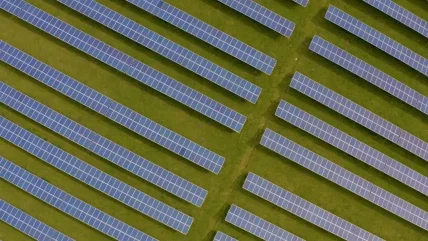
In a move set to power up Great Britain’s green energy future, Octopus Energy’s generation arm announces plans to pump £2 billion into UK clean energy projects by 2030.
Octopus seals the deal on four new solar farms being developed by BayWa r.e. in Bristol, Essex, East Riding of Yorkshire and Wiltshire. The solar projects will have a combined capacity of 222 MW, in addition to a 30 MW battery located on one of the sites.
Construction on three of these solar farms will start later this year and the fourth in 2025. Due to be operational between 2025-2026, the farms will produce power for 80,000 homes, slashing emissions equivalent to removing 35,000 fossil-fuel cars from the road every year.
This comes as the UK Government is targeting tripling solar capacity by 2030.
Octopus is also breaking ground on a new 12 MW battery in Cheshire, to store and zap enough power back into the grid to keep nearly 10,000 homes running a day. Batteries help balance the grid, storing green power when abundant so it doesn’t go to waste.
With these latest additions, Octopus now backs 16 onshore wind farms, 3 offshore wind farms, 3 battery projects, 138 solar farms, and thousands of rooftop solar projects in Britain.
The new solar farm deals were agreed on behalf of the Octopus Energy Development Partnership (OEDP) and Sky fund (ORI SCSp), managed by Octopus Energy Generation.
Octopus recently increased its stake in Exagen, a fast-growing British solar and storage developer, to 100% through its OEDP fund. It first invested in Exagen in 2022 and has upped this to speed up the rollout of new renewables projects in the UK.
Following the Government’s onshore wind planning reforms in England, Octopus is also submitting multiple applications for new wind turbines this year. These will join Octopus’ much-loved ‘Fan Club’ scheme, which gives customers close to the turbines up to 50% discounted rates when the wind is blowing.
Zoisa North-Bond, CEO of Octopus Energy Generation, said: “The UK is on the verge of a green energy revolution. This £2 billion investment in homegrown renewables will help boost our energy security and pave the way for a more affordable energy future. Solar and onshore wind are among the cheapest energy sources available. By building closer to demand, we can maximise green electricity when it’s abundant and lower bills for customers nationwide.”






